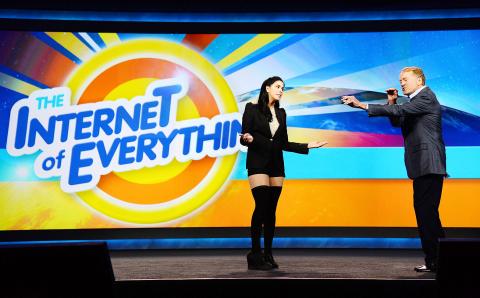Cisco Systems Inc chief executive officer John Chambers said that the Internet of Everything — connected products ranging from cars to household goods — could be a US$19 trillion opportunity.
In a keynote presentation on Tuesday at the International Consumer Electronics Show (CES), which also featured US comedian Sarah Silverman, Chambers drew a picture of a world in which Internet-connected objects in homes, at airports, at hotels and elsewhere are programmed with people’s preferences. That could lead to consumers buying more goods, he said.
Such connectivity will have other ripple effects, including linked garbage cans reducing waste management costs by 30 percent, Chambers said at the giant technology trade show in Las Vegas.

Photo: AFP
“This is not about technology at all,” Chambers said. “It’s about how it changes peoples’ lives forever.”
Cisco is delving into the Internet of Things as it faces slowing sales in its networking-gear business. Revenue is projected by analysts to decline almost 5 percent in the current fiscal year, according to data compiled by Bloomberg.
Last month, the San Jose, California-based company cut its sales growth outlook for the next three to five years amid weaker demand from emerging markets and telecommunications service providers.
Cisco last year formed a group to focus on the Internet of Everything, with projects including designing wristwatches for soldiers and centrally linking medical facilities and educational systems inside cities. With more devices coming online, Cisco is working to sell more networking equipment, as well as software and services.
“We think the Internet of Everything is the biggest transition for the Internet since the birth of the Internet,” Cisco senior vice president Kip Compton said in an interview.
The Internet of Everything could boost global corporate profits by 21 percent by 2022, Cisco said in slides prior to Chambers’ presentation.
By 2020, 50 billion objects will be connected to the Internet, according to the slides.
Cisco is making a big push at CES this year, even after it has shed many of its consumer-technology businesses.
The world’s biggest maker of networking equipment has an exhibit on the main floor of the trade show this year for the first time. And Cisco has made several announcements, including a deal with Samsung Electronics Co to offer Web conferencing capabilities on Galaxy devices, as well as a new cloud-based video service that lets service providers and media companies deliver video to consumers faster.
Cisco said it isn’t “re-entering the consumer business” with its activities at CES.
Yet “CES 2014 provides an ideal venue for our executives to interact with key partners, customers and industry influencers,” Cisco spokesman Jim Brady said.
Separately, Sony Corp will begin testing an Internet-based pay-television service in the US this year, bringing live and on-demand programming to TVs and its PlayStation game consoles.
The product will make it easy for consumers to switch between live and Web-based programs, Sony Computer Entertainment chief executive officer Andrew House said on Tuesday at the CES event. The Tokyo-based company will also test a video-game streaming service for the PlayStation, smartphones and TVs.
The company has held talks with media companies including CBS Corp, Comcast’s NBCUniversal, 21st Century Fox Inc’s Fox Networks and its own Sony film and TV studios for content rights, according to people with knowledge of the situation, who asked not to be identified because negotiations are private.

Intel Corp chief executive officer Lip-Bu Tan (陳立武) is expected to meet with Taiwanese suppliers next month in conjunction with the opening of the Computex Taipei trade show, supply chain sources said on Monday. The visit, the first for Tan to Taiwan since assuming his new post last month, would be aimed at enhancing Intel’s ties with suppliers in Taiwan as he attempts to help turn around the struggling US chipmaker, the sources said. Tan is to hold a banquet to celebrate Intel’s 40-year presence in Taiwan before Computex opens on May 20 and invite dozens of Taiwanese suppliers to exchange views

Application-specific integrated circuit designer Faraday Technology Corp (智原) yesterday said that although revenue this quarter would decline 30 percent from last quarter, it retained its full-year forecast of revenue growth of 100 percent. The company attributed the quarterly drop to a slowdown in customers’ production of chips using Faraday’s advanced packaging technology. The company is still confident about its revenue growth this year, given its strong “design-win” — or the projects it won to help customers design their chips, Faraday president Steve Wang (王國雍) told an online earnings conference. “The design-win this year is better than we expected. We believe we will win

Chizuko Kimura has become the first female sushi chef in the world to win a Michelin star, fulfilling a promise she made to her dying husband to continue his legacy. The 54-year-old Japanese chef regained the Michelin star her late husband, Shunei Kimura, won three years ago for their Sushi Shunei restaurant in Paris. For Shunei Kimura, the star was a dream come true. However, the joy was short-lived. He died from cancer just three months later in June 2022. He was 65. The following year, the restaurant in the heart of Montmartre lost its star rating. Chizuko Kimura insisted that the new star is still down

While China’s leaders use their economic and political might to fight US President Donald Trump’s trade war “to the end,” its army of social media soldiers are embarking on a more humorous campaign online. Trump’s tariff blitz has seen Washington and Beijing impose eye-watering duties on imports from the other, fanning a standoff between the economic superpowers that has sparked global recession fears and sent markets into a tailspin. Trump says his policy is a response to years of being “ripped off” by other countries and aims to bring manufacturing to the US, forcing companies to employ US workers. However, China’s online warriors